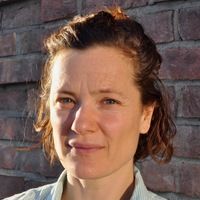
Cite as:
Okune, Angela. 2018. "Noémi Tousignant." In STS in "Africa" Personal Careers. In STS in "Africa" in Formation, created by Angela Okune and Aadita Chaudhury. In STS Across Borders Digital Exhibit, curated by Aalok Khandekar and Kim Fortun. Society for Social Studies of Science. August.
Noémi Tousignant is a historian of science and public health in late-colonial and postcolonial Africa, specifically focused on Senegal. She is a lecturer in Science and Technology Studies at University College London. Tousignant studied the History of Medicine at McGill University and since 2006, has been working on the history and ethnography of pharmaceuticals, pharmacists and health research in colonial and post-independence Senegal.
Noémi Tousignant est une historienne des sciences et de la santé publique en Afrique coloniale et postcoloniale, centrée sur le Sénégal. Elle est professeur de cours en sciences et technologies à l'University College London. Tousignant a étudié l'histoire de la médecine à l'Université McGill et, depuis 2006, travaille sur l'histoire et l'ethnographie des produits pharmaceutiques, des pharmaciens et de la recherche en santé au Sénégal dans les colonies et après l'indépendance.
This PECE essay helps to answer the STS Across Borders analytic question: “What people, projects, and products exemplify how this STS formation has developed over time?”
This essay highlights prominant and upcoming individuals working on critical science and technology issues in Africa and is part of a broader exhibit on "STS in Africa."
STS Across Borders is a special exhibit organized by the Society for Social Studies of Science (4S) to showcase how the field of Science and Technology Studies (STS) has developed in different times, places...Read more
In this 2014 blog post from Somatosphere, Wenzel Geissler, Ann H. Kelly, John Manton and Noémi Tousignant describe a workshop held at the Finse Alpine Research Station in Oslo looking at the way in which the far-flung circuits of scientific travel become enmeshed in the mundane practices of...Read more
Noémi Tousignant (March 13, 2018): "Scholars seem to be growing more interested in experimentation as a technology of development. The idea of Randomized Controlled Trials (RCTs) are being extended to other types of development interventions that aren’t necessarily about science and tech....Read more
Noémi Tousignant (March 13, 2018): "I did a masters at Manchester in the History of Science, Technology and Medicine program which is quite STS-focused and then moved into doing pharmaceuticals where I was more engaged with the health literatures and not necessarily knowledge production or the politics of technology and then now looping back to having much more of an STS approach. Along the way becoming very interested in the issue of capacity which, in my opinion is under researched and under theorized. I hope the main contribution with my book on toxicology is opening up a conversation on how capacity is actually made and defined by scientists themselves and in relation to critical problems of the government of life."
Noémi Tousignant (March 13, 2018): "As an extreme case of struggle or fragility of capacity and where capacity has such high vital and political stakes, capacity is a kind of topic where questions can be worked out and posed that are relevant to more high-resourced places where we tend not to ask about the making and maintaining of capacity to produce knowledge and do research."
Noémi Tousignant (March 13, 2018): "I think an important audience for my work are the African scientists themselves. I work on the local publicly state-funded science and the kind of people I interact with most are those who are not only my "subjects" but also my colleagues in this work. They are the ones who are engaging with it most directly. I have a feeling that is generally the case with those doing work like mine, e.g. the people I know who work in medical research develop interesting relationships with the doctors they do research “on” but who are also more critical of the knowledge production."
Noémi Tousignant (March 13, 2018): "Building on the book that just came out, my next project will grapple with the question of “protection” and “unprotection” and the way in which scientific knowledge and the distribution of technology and assumptions and questions that go into making knowledge contribute to protecting and producing gaps in protection. The project I am developing is on liver cancer and looking at what have been identified in Senegal and The Gambia as the main risks of exposure. There has been well-worn narratives about the lack of science and tech or the violent use as of technology for control. But there has been less about the nature of protection, especially in relation with more general historic and ethnographic work on Africa on the state as a predatory entity (leaving out the protective potential of public institutions). That is where I want to frame my STS questions on knowledge production, distribution of technological capacity and the coming into being of protective public institutions. I will be exploring this in a new position at University College London in the Department of Science and Technology Studies as a Lecturer and Wellcome Trust University Award Holder."
AO: This 2016 article by Geissler and Tousignant look at the neglect of investing in the capacity of African state-run public health systems as a whole in spite of growing rise of collaborative research in global health in Africa and "capacity building" of individual researchers and groups.Read more